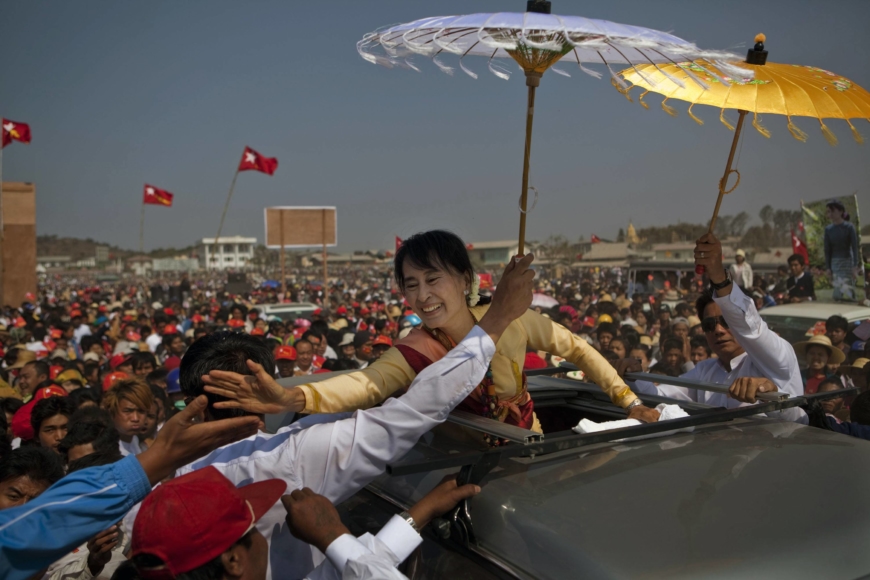[ad_1]
Now that Myanmar’s generals have ousted Aung San Suu Kyi, they must figure out how to beat her in an election.
Coup leader Min Aung Hlaing said Monday he would revamp the election commission and hold a “free and fair†vote once the state of emergency expires in a year. He justified the military takeover by alleging widespread fraud in a November election in which Suu Kyi’s National League for Democracy won more than 80% of available seats.
The claims of a rigged election haven’t been backed up by any credible evidence. Myanmar’s election commission rejected allegations of fraud and international observers largely gave the vote a clean bill of health.
But those are minor details for the country’s top generals, who have been repeatedly trounced by Suu Kyi dating back to a 1990 election that the army also rejected. It took 18 years for a junta to write a new constitution that guaranteed the military a veto on any changes, and its designated army-backed political party only won in 2010 because Suu Kyi was under house arrest and her party boycotted. She won the last two votes in a landslide.
“Despite a constitution that favored it on several fronts, military-backed opposition parties were no match for the National League of Democracy come election time,†said Lee Morgenbesser at Griffith University in Australia, who studies authoritarianism in Southeast Asia. “Having ‘committed’ to holding a free and fair general election, the ruling junta is now likely to dissolve or bar the NLD on frivolous grounds.â€
Myanmar’s army has plenty of examples in Asia of powerful elites that write rules favoring the establishment at election time. While these exercises in democracy are flawed and usually come with repression of opposition voices, they also help avoid global condemnation and financial penalties that scare away Western investors — a prospect now facing Myanmar after U.S. President Joe Biden threatened to reimpose sanctions.
Last month, Malaysia’s king declared a nationwide state of emergency for the first time in more than half a century, suspending parliament in a move that allowed embattled Prime Minister Muhyiddin Yassin to avoid facing an election until the pandemic is over. Singapore’s ruling party has held power since 1965, helped by election rules that have been criticized by opposition politicians.

In Thailand, a military-backed government led by Prime Minister Prayuth Chan-Ocha has managed to hang onto power since its own coup in 2014. It has used an array of measures to weaken the opposition, including dissolving a popular youth-led party and using legal channels to bar key figures from running for office.
Other countries that don’t hold elections have managed to win favor from the U.S. by acting as a counterweight to China. Vietnam Communist Party chief Nguyen Phu Trong, who was granted a rare third term in power this week, was welcomed to the White House in 2015 by U.S. President Barack Obama.
Myanmar’s 2008 constitution already gave the military lots of power. It guaranteed the armed forces 25% of seats in parliament, giving it an effective veto over any amendments, and further enabled it to take power under vague terms through a state of emergency, as occurred on Monday.
Generals spooked
Still, Suu Kyi’s massive popularity spooked the top generals, who had shot down proposals over the years for constitutional changes that would dilute their power. Prior to the coup, the military and civilian government clashed over a constitutional amendment that would allow Suu Kyi to serve as president, which wasn’t allowed because her children are U.K. citizens. Military spokesman Brigadier-General Zaw Min Tun didn’t answer several calls seeking comments for this story.
Army leaders feared “there was going to be overwhelming pressure for constitutional change that might start to erode those powers that the military were clinging on to,†Andrew Heyn, a former British ambassador to Myanmar, told Bloomberg Television.
Myanmar’s new military regime has already started to lay the groundwork for changes while Suu Kyi and other top NLD leaders remain under house arrest. It has filled key senior positions in the cabinet and judiciary with allies, and re-instated supreme and high court judges as well as all members of its anti-corruption commission. Suu Kyi has urged her supporters to oppose the army’s move, calling it “an attempt to bring the nation back under the military dictatorship.â€
“The military may think of ways to get what they want without changing the judges,†said Nang Raw Zahkung, director of policy and strategy at Nyein (Shalom) Foundation, a group that works to promote peace in Myanmar.

Suu Kyi popularity
To ensure the military wins the next election, assuming they actually try to hold one, its leaders could employ some tactics seen elsewhere in the region. They include amending the constitution and election laws, filing criminal charges against key opposition leaders and asserting control of the country’s election commission, which the army chief has already said would be reconfigured.
Pulling that off won’t be easy. Although the streets are quiet now, Myanmar has a history of pro-democracy uprisings followed by bloody crackdowns. Suu Kyi remains the most popular figure in country by far and the NLD would likely win a re-run election even if she and other key party leaders were unable to contest the polls, said Peter Mumford, Southeast & South Asia practice head at risk consultancy Eurasia Group.
“That suggests the military will explore, as has happened elsewhere in the region, reforming the electoral system to make it harder for a single party to dominate parliament,†he said. “Although the bloodless coup itself was clearly well planned, it remains unclear whether the military has thought through what comes next.â€
In a time of both misinformation and too much information, quality journalism is more crucial than ever.
By subscribing, you can help us get the story right.
KEYWORDS
[ad_2]
Source link





